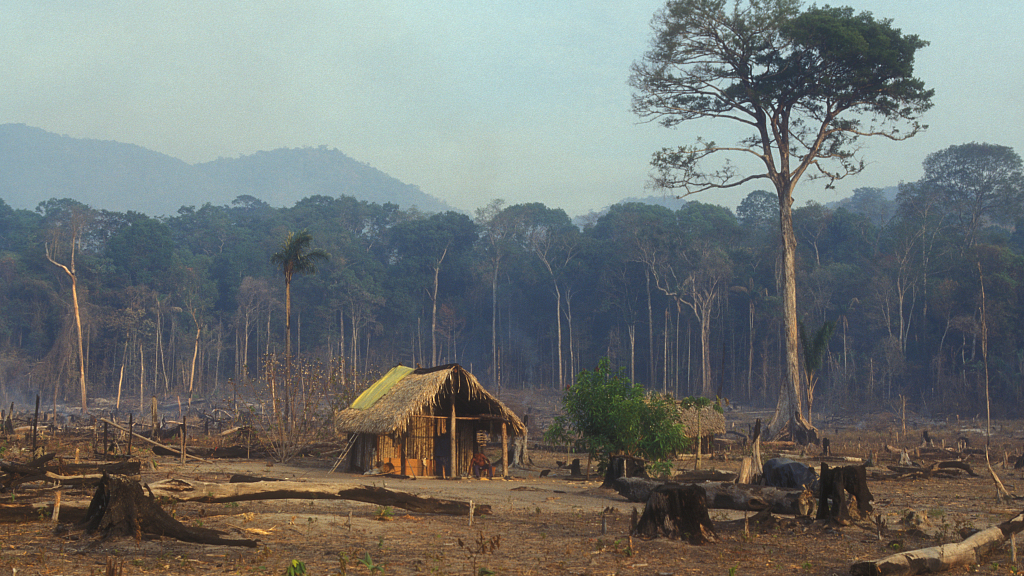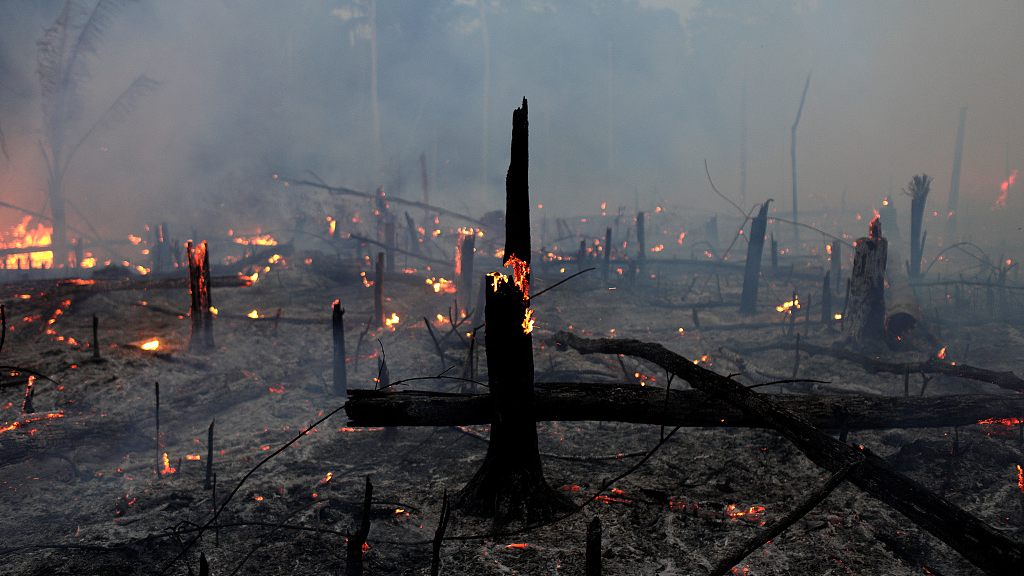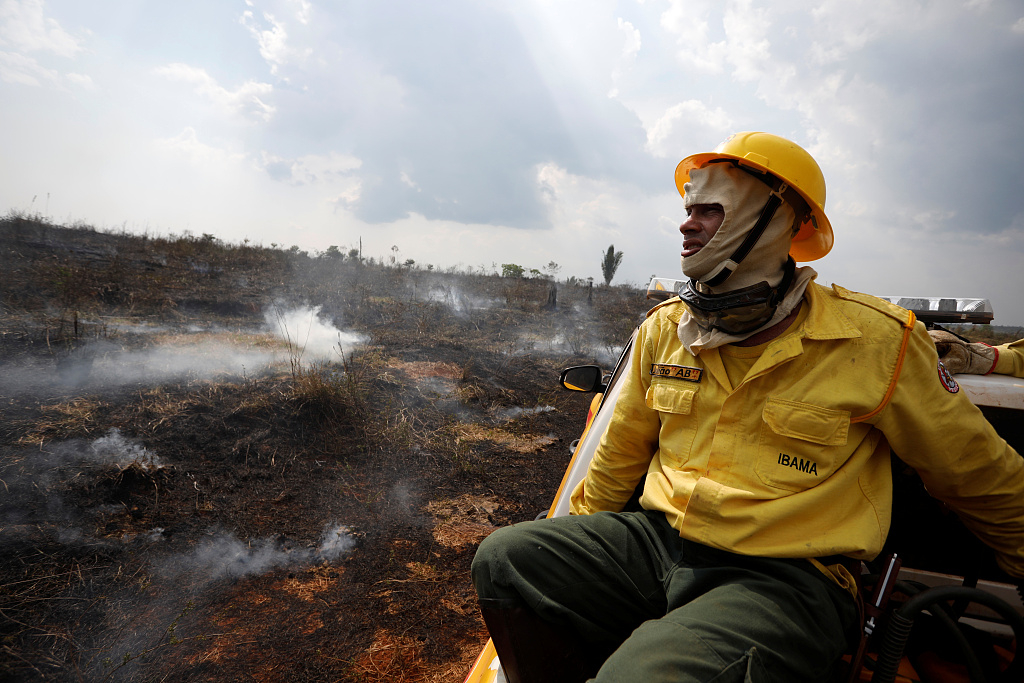
Official data from the National Institute for Space Research (INPE) shows that, with 30,901 fires, August 2019 was the worst August for the Amazon forest in Brazil since 2010. This number is almost three times higher than the 10,421 fires registered in August 2018.
Between January and August this year, a total of 46,825 fires raged the rainforest, more than twice the 22,165 registered for the same period in 2018. The monthly comparison indicates an almost 600 percent rise from July's 5,318 blazes to 30,901 last month.

VCG Photo
In 2010, a total of 134,614 fires blazed through the Amazon biome in Brazil, which consists of nine states – Acre, Amazonas, Roraima, Rondonia, Para, Amapa, Maranhao, Tocantins, and Mato Grosso – and it's 4.1 million square kilometers. In August that year, 45,018 fires were active, making it the most tragic month from 2010 to this year.
The 10-year data also shows that September is an even more critical month, which since 2010 has had more blazes than August due to drier weather conditions. But, with the ban, signed on August 28, prohibiting the use of fire to clear land throughout the country for 60 days, there is now hope for a positive outcome.
Fire ban has no impact during first 48 hours
Unfortunately, the first 24 and 48 hours didn't match that prospect. According to Greenpeace Brazil, during the first 24 hours of the ban, the number of burning sites rose 106 percent.
48 hours into the ban, satellite data showed 3,859 new outbreaks, of which some 2,000 were concentrated in the Amazon region, AFP reported.
Know more: 'Earth's lungs' on fire

A fire burns a tract of Amazon jungle as it is cleared by a farmer in Machadinho do Oeste, Rondonia state, Brazil, September 2, 2019. Ricardo Moraes. /VCG Photo
Danicley de Aguiar from the Greenpeace Amazon campaign says in the environmental group website that "even though banning land clearing fires is important; this measure in itself is not enough to solve the blaze problem in the Amazon."
"The numbers show that Bolsonaro will not control the fire wave that is sweeping through the Amazon with a decree," said de Aguiar, adding that the official order should be met with real and effective measures to command and control the region. This should also be associated with a consistent inspection and monitoring strategy, coordinated by the Brazilian Institute of Environment and Renewable Natural Resources (IBAMA) and Chico Mendes Institute for Biodiversity Conservation (Brazilian Ministry of the Environment's administrative arm, named after the environmental activist Chico Mendes), noted the activist.
De Aguiar also stressed taking activities like illegal mining, land occupation and hardwood trafficking into account in the region as they are common, and those who commit these acts have no intention of making a formal request or even abide by a presidential decree.
Know more: Fires not the only threat facing the Amazon
"As important as controlling the fires is, Bolsonaro should also decree the end of the anti-environmental agenda that he, himself, has been promoting," concluded de Aguiar.
Deforestation is fuel to the flames
INPE data on the area shows that in the first eight months of 2019, a total of 43,593 square kilometers of the Amazon was burned, more than half of that, 57 percent, burned in August alone.
Specialists consulted by the Brazilian news outlet "O Globo" say that deforestation is fuel to the fires. Carlos Bocuhy, president of the Brazil Environmental Protection Institute, noted that the forest is humid so isn't a spontaneous combustion organism, so the fire will start in regions where the trees were cut down and left to dry.
The representative says it is too early to say if the Brazilian President Jair Bolsonaro ban is enough to reduce the fires. On the contrary, there are worries that inaction will lead to more fires in already deforested lands that now need "cleaning."

IBAMA fire brigade member is seen as he attempts to control hot points during a fire in Apui, Amazonas state, Brazil August 31, 2019. Bruno Kelly /VCG Photo
Forestry engineer Tasso Azevedo revealed the same apprehension, indicating that deforestation increased in July so there are a lot of natural resources available to burn. "Everything will depend on how official measures by the government will be adopted."
To AFP, analysts also indicated that the no-burn decree may have been too little too late, and more of a political than a practical gesture, since the international backlash was significant.
Jair Bolsonaro's first reaction to the fires was to accuse non-governmental organizations of setting up the blazes. Before that, he also doubted INPE reasons for issuing 8,352 deforestation or forest degradation alerts and calling for law enforcement action.
Since becoming President, there were several environmental policy changes, including penalty elimination, discharge of IBAMA superintendents, and weakening safeguard of protected areas, reported newspaper Folha de S. Paulo.

Copyright © 2018 CGTN. Beijing ICP prepared NO.16065310-3
Copyright © 2018 CGTN. Beijing ICP prepared NO.16065310-3